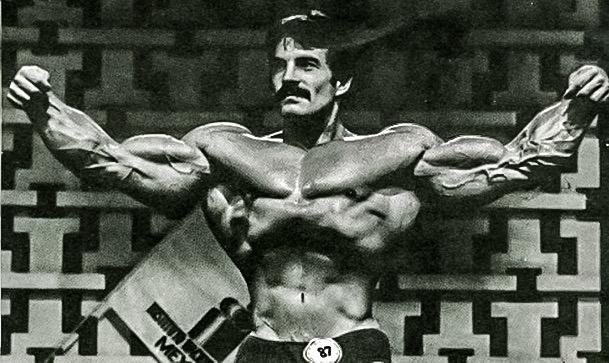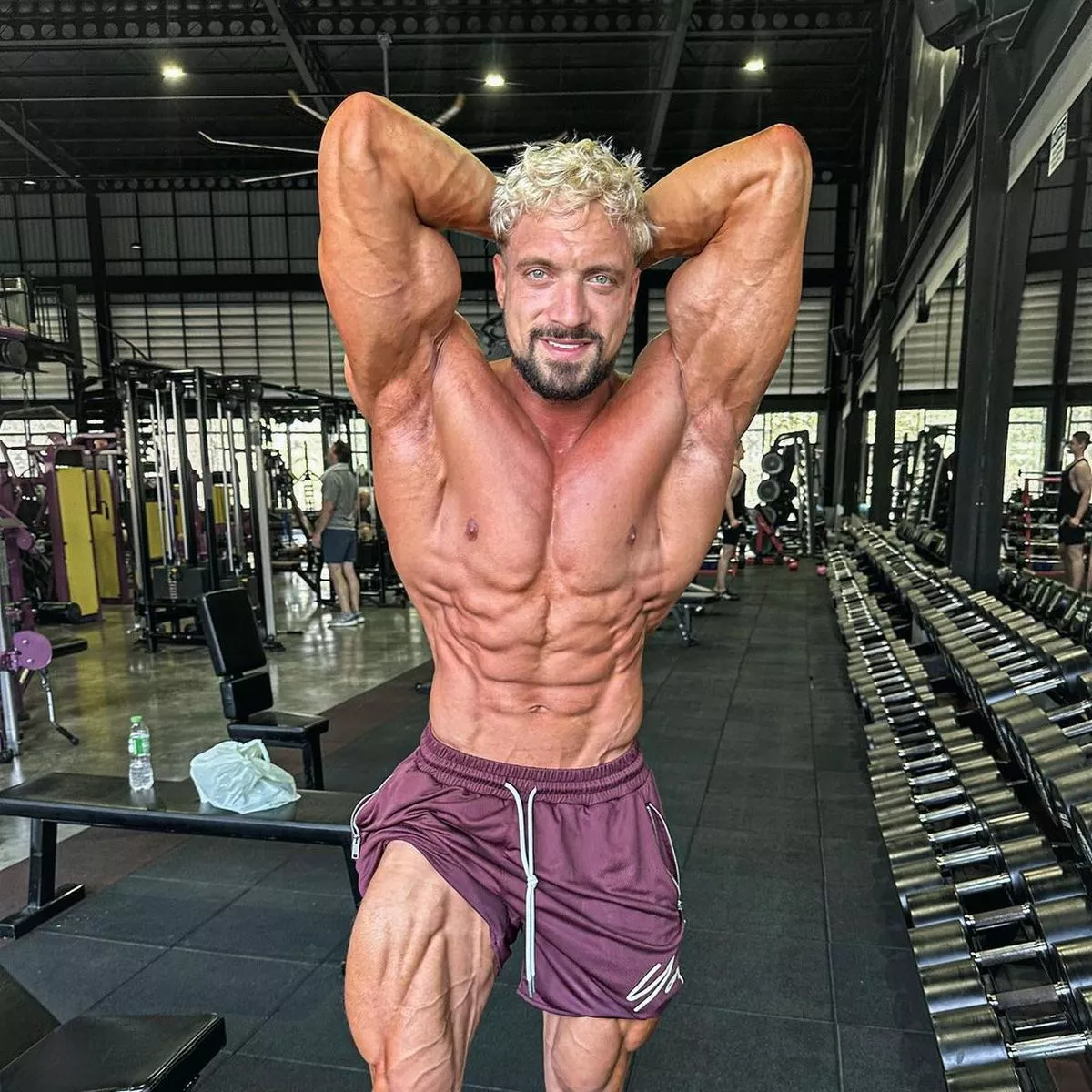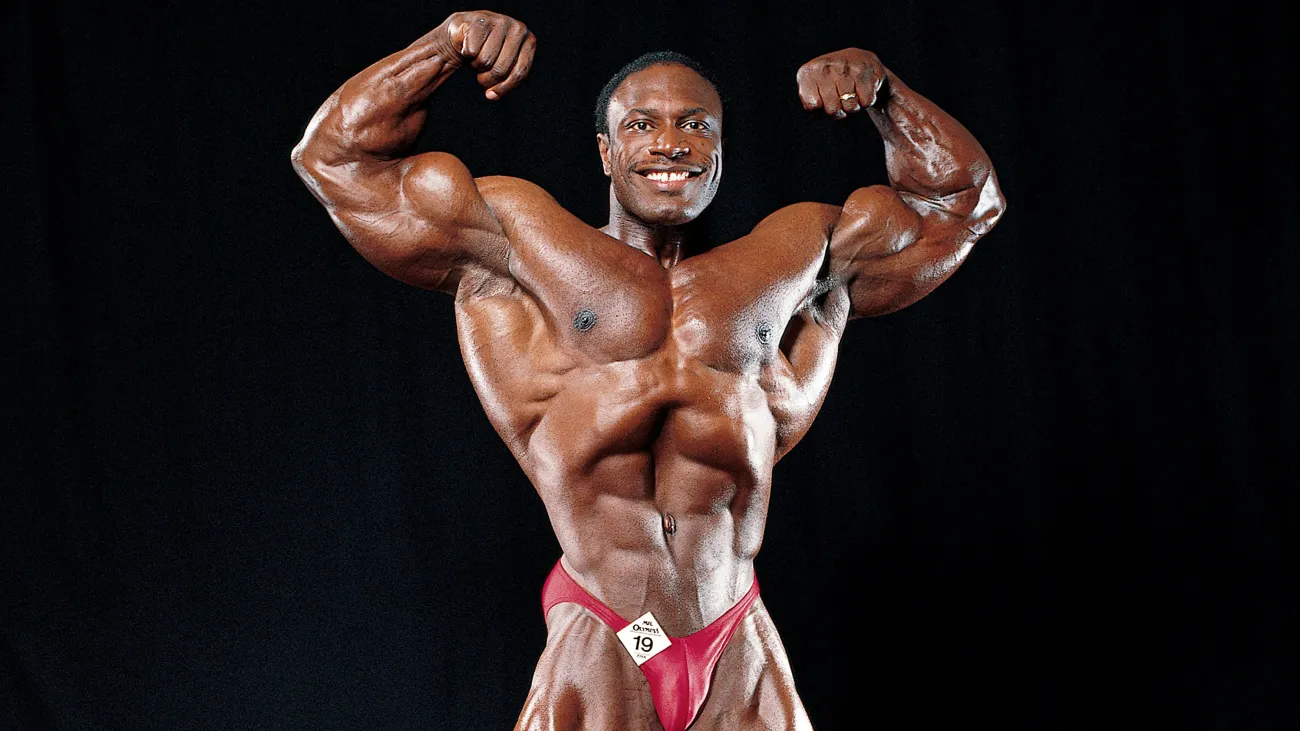Michael John Mentzer (November 15, 1951 – June 10, 2001) was an American IFBB professional bodybuilder, businessman, and author. Born in Pennsylvania, Mentzer started bodybuilding when he was eleven years old. He won several amateur bodybuilding competitions before turning professional in 1979, including the 1976 Mr. America title and the heavyweight division of the 1978 IFBB Mr. Universe. In late 1979, he won the heavyweight class of the Mr. Olympia, but lost in the overall to Frank Zane. In the 1980 Mr. Olympia he placed fourth in a tie with Boyer Coe behind Arnold Schwarzenegger, Chris Dickerson and Frank Zane.
Influenced by the concepts developed by Arthur Jones, Mentzer devised and successfully implemented his own theory of bodybuilding. One of the most iconic bodybuilders of all time, his Heavy Duty Training program still inspires lifters to this day. In 2002, he was inducted into the IFBB Hall of Fame.

Early life and education
Mike Mentzer was born on November 15, 1951, in the Germantown section of Philadelphia and his father was of German descent and his mother was of Italian descent. In grammar school and Ephrata High School, he received “all A’s.” He credits his 12th grade teacher, Elizabeth Schaub, for his “love of language, thought, and writing.” In 1975, he started attending the University of Maryland as a pre-med student where his hours away from the gym were spent in the study of “genetics, physical chemistry, and organic chemistry.” After three years of study at the University of Maryland he dropped out. He said his ultimate goal during that period was to become a psychiatrist.
Mike Mentzer is a name that resonates deeply in the world of bodybuilding. Known for his revolutionary training philosophy, unparalleled physique, and intellectual approach to the sport, Mentzer left an indelible mark on bodybuilding. This blog explores his life, career, legacy, Heavy Duty philosophy, diet and nutrition approach, training regimen, relationship with his brother Ray, and his untimely death.
Bodybuilding Career
Inspired by bodybuilding legends like Bill Pearl and Larry Scott, he began training in his early teens. His dedication to the sport quickly bore fruit, and by 1971, he had won the Mr. Lancaster contest at just 19 years old.
Mentzer’s career skyrocketed in the late 1970s when he competed in the International Federation of Bodybuilding & Fitness (IFBB) competitions. His muscularity, symmetry, and conditioning earned him widespread recognition. In 1978, he achieved a historic victory by winning the heavyweight class at the IFBB Mr. Universe with a perfect score – the first in the competition’s history.
The pinnacle of Mentzer’s competitive career came at the 1980 Mr. Olympia, where he placed fifth in a controversial decision. Many believed his placement was unfair, as the competition was marred by disputes and debates about judging criteria. Disillusioned by the politics of competitive bodybuilding, Mentzer retired shortly afterward.

Legacy and Heavy Duty Philosophy
Mike Mentzer’s legacy extends far beyond his competitive achievements. He is best remembered for his Heavy Duty training philosophy, which challenged conventional bodybuilding wisdom. Influenced by the principles of Arthur Jones, Mentzer advocated for brief, high-intensity workouts as opposed to the long, high-volume sessions popular at the time.
Heavy Duty emphasized:
- Intensity Over Volume: Mentzer believed that maximum effort in fewer sets produced superior results compared to performing numerous sets with moderate effort.
- Progressive Overload: He stressed the importance of gradually increasing resistance to stimulate muscle growth.
- Adequate Recovery: According to Mentzer, overtraining was a common pitfall, and ample rest between workouts was essential for optimal progress.
These principles were groundbreaking and continue to influence training methodologies today. Mentzer’s books, including Heavy Duty and High-Intensity Training the Mike Mentzer Way, remain seminal works in the bodybuilding literature.

Diet and Nutrition
Mike Mentzer’s approach to diet and nutrition was as methodical as his training philosophy. He believed in tailoring one’s diet to individual needs and advocated for:
- Caloric Balance: Consuming calories proportional to energy expenditure.
- Macronutrient Optimization: A balanced intake of proteins, carbohydrates, and fats to support muscle growth and recovery.
- Supplementation: While Mentzer promoted a whole-foods approach, he recognized the role of supplements like protein powders and vitamins in achieving optimal performance.
Mentzer’s diet was simple but effective, focusing on lean protein sources, complex carbohydrates, healthy fats, and adequate hydration. He discouraged extreme dieting practices and emphasized sustainability.
Training and Workouts
Mentzer’s training regimen was concise but brutal. A typical Heavy Duty workout consisted of:
- Warm-Up: Brief but sufficient to prepare for the intense workload.
- Main Lifts: Compound exercises like squats, deadlifts, bench presses, and pull-ups performed to failure in one or two sets.
- Slow Tempo: Controlled, deliberate movements to maximize muscle engagement.
- Frequency: Workouts were performed 1-3 times per week, depending on recovery.
This minimalist yet effective approach set Mentzer apart and inspired a loyal following of athletes who sought to break free from traditional, time-consuming training methods.
Here’s a 4-day Heavy Duty training routine inspired by Mike Mentzer’s principles. This program focuses on brief, intense workouts with ample rest to promote recovery and growth. The aim is to prioritize intensity, proper form, and progressive overload.

General Guidelines
- Intensity: Perform each set to absolute failure. Consider adding forced reps, negatives, or static holds for additional intensity.
- Rest: Take 2-4 minutes between exercises to ensure full recovery.
- Frequency: Train every other day or split into a rotating weekly schedule to allow for optimal recovery.
- Tempo: Use a slow, controlled tempo (4-2-4 seconds; 4 seconds eccentric, 2 seconds pause, 4 seconds concentric).
- Volume: Perform only 1-2 working sets per exercise after a proper warm-up.
- Progression: Increase weight or reps when you can perform more than the target range with perfect form.
Day 1: Chest & Back
Warm-up: 5-10 minutes light cardio + dynamic stretches.
Chest
- Incline Dumbbell Press: 1-2 working sets (6-10 reps to failure)
- Flat Bench Press (Barbell or Dumbbell): 1 working set (6-10 reps to failure)
- Pec Deck Machine (or Dumbbell Flyes): 1 working set (8-12 reps to failure)
Back
- Pull-Ups or Lat Pulldown: 1-2 working sets (6-10 reps to failure)
- Barbell Rows or T-Bar Rows: 1 working set (6-10 reps to failure)
- Deadlifts: 1 working set (5-8 reps to failure)
Day 2: Rest or Light Active Recovery
Day 3: Legs
Warm-up: 5-10 minutes light cardio + leg stretches.
Quads
- Leg Press or Squat (Barbell or Machine): 1-2 working sets (6-10 reps to failure)
- Leg Extension: 1 working set (8-12 reps to failure)
Hamstrings
- Romanian Deadlifts (Barbell or Dumbbell): 1 working set (6-10 reps to failure)
- Leg Curl Machine: 1 working set (8-12 reps to failure)
Calves
- Standing Calf Raises: 1-2 working sets (10-15 reps to failure)
- Seated Calf Raises: 1 working set (12-15 reps to failure)
Day 4: Rest or Light Active Recovery
Day 5: Shoulders & Arms
Warm-up: 5-10 minutes light cardio + shoulder mobility exercises.
Shoulders
- Overhead Press (Dumbbell or Barbell): 1-2 working sets (6-10 reps to failure)
- Lateral Raises: 1 working set (10-12 reps to failure)
- Rear Delt Flyes or Reverse Pec Deck: 1 working set (10-12 reps to failure)
Biceps
- Barbell or Dumbbell Curls: 1-2 working sets (6-10 reps to failure)
- Concentration or Preacher Curl: 1 working set (8-12 reps to failure)
Triceps
- Close-Grip Bench Press or Dips: 1-2 working sets (6-10 reps to failure)
- Overhead Triceps Extension (Dumbbell or Cable): 1 working set (8-12 reps to failure)
Day 6: Rest or Light Active Recovery
Day 7: Optional Active Recovery or Complete Rest
Additional Tips
- Diet: Prioritize high-protein meals with sufficient calories to fuel recovery.
- Sleep: Aim for 7-9 hours of quality sleep nightly.
- Supplements: Consider whey protein, creatine, and BCAAs as needed to support recovery.
- Tracking: Keep a log of your weights, reps, and progression.
The Mentzer Brothers: Mike and Ray
Mike shared a close bond with his younger brother, Ray Mentzer, who was also an accomplished bodybuilder. Ray won the 1979 Mr. America and was a proponent of the Heavy Duty system. The brothers often trained together and were mutual sources of inspiration and support.
Their relationship extended beyond the gym, as they collaborated on promoting the Heavy Duty philosophy and contributed to bodybuilding’s intellectual discourse. Their partnership was a testament to the power of shared vision and sibling camaraderie.

Here is a summary of Mike Mentzer’s competitive bodybuilding career and placements:
Amateur Competitions:
- 1971 Mr. Lancaster (14th place) – Mike’s first competition.
- 1971 AAU Mr. America – Did not place.
- 1975 Mr. East Coast (3rd place).
- 1976 IFBB Mr. America (2nd place, Heavyweight Division).
- 1976 IFBB Universe (3rd place, Heavyweight Division).
- 1978 IFBB USA vs. The World (1st place).
- 1978 IFBB Mr. America (1st place, Overall Winner) – His breakout victory, earning him professional status.
- 1978 IFBB World Amateur Championships (1st place, Heavyweight Division) – Secured his IFBB Pro Card.
Professional Competitions:
- 1979 Night of Champions (2nd place) – Strong debut in a pro lineup.
- 1979 Mr. Olympia (1st place, Heavyweight Division) – Scored a perfect 300, one of the rare achievements in Olympia history.
- 1979 Mr. Olympia (Overall, 2nd place) – Narrowly lost to Frank Zane.
- 1980 Mr. Olympia (5th place) – His final competition, marred by controversy surrounding Arnold Schwarzenegger’s win.
Mike Mentzer retired from professional bodybuilding after the 1980 Mr. Olympia, disillusioned by the politics and judging inconsistencies in the sport. Despite a relatively short career, his influence as a pioneer of High-Intensity Training (HIT) has left a lasting impact on the fitness world.

Mr. Olympia 1980
The 1980 Mr. Olympia is one of the most controversial events in bodybuilding history. Held in Sydney, Australia, it marked Arnold Schwarzenegger’s unexpected return to competition after a five-year retirement. Despite being visibly less conditioned than in his prime, Arnold won the title, sparking widespread criticism and allegations of favoritism among the judges.
Mike Mentzer, a top contender and the first bodybuilder to score a perfect 300 in a professional competition, placed fifth—a result that left him and many others outraged. The controversy surrounding the judging and the perceived politics of the event deeply disillusioned Mentzer. Feeling the competition lacked integrity, he retired from professional bodybuilding shortly afterward, leaving behind a legacy of his advocacy for High-Intensity Training (HIT) and his principled stand on fairness in the sport.
Read the full article about the most controversial Mr. Olympia championship in history – 1980
https://musclelab.blog/mike-mentzer-e-o-hevay-duty-x-arnold-schwarzenegger-mr-olympia-1980/

Death and Posthumous Impact
Tragically, Mike Mentzer’s life was cut short on June 10, 2001, at the age of 49. He passed away in his sleep due to heart complications. Shockingly, his brother Ray died just two days later, also from heart-related issues. Their deaths marked the end of an era but cemented their legacy in bodybuilding history.
Despite his untimely passing, Mike Mentzer’s influence endures. His Heavy Duty philosophy remains a cornerstone of high-intensity training, and his intellectual contributions have inspired countless athletes to approach bodybuilding with a scientific mindset.
Conclusion
Mike Mentzer’s journey was one of passion, innovation, and determination. From his rise as a competitive bodybuilder to his role as a revolutionary thinker, Mentzer reshaped the landscape of bodybuilding. His Heavy Duty philosophy, commitment to individualized training and nutrition, and enduring legacy continue to inspire athletes worldwide.
Mike Mentzer wasn’t just a bodybuilder; he was a visionary who dared to challenge conventions and left behind a blueprint for success that transcends the gym. His story is a reminder that greatness lies in the courage to think differently and pursue excellence relentlessly.



One Response
Mike Mentzer the Titan of Bodybuilding – Workout, Life, Heavy Duty and Death – musclelab.blog
[url=http://www.g89u9r21pw84d1r9h3a12v27l93wgsvqs.org/]uszxnovxoox[/url]
aszxnovxoox
szxnovxoox http://www.g89u9r21pw84d1r9h3a12v27l93wgsvqs.org/